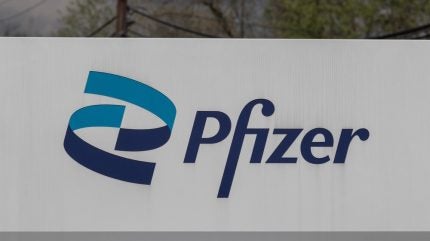
Pfizer’s cancer cachexia candidate has provided patients with clinically meaningful weight gain in a Phase II trial, with the company sharing aims to start a pivotal programme in 2025.
The company’s Growth/Differentiation Factor 15 (GDF-15)-targeting monoclonal antibody ponsegromab met the primary endpoint of the Phase II study (NCT05546476) in all treatment arms, with more than 5% weight gain in the high dose arm.

Discover B2B Marketing That Performs
Combine business intelligence and editorial excellence to reach engaged professionals across 36 leading media platforms.
Cachexia, also known as wasting syndrome, is characterised by weight and muscle mass loss that commonly affects cancer patients, yet there are currently no US Food and Drug Administration (FDA) approved options for its treatment. Current standard of care for cancer cachexia patients in feeding tubes or intravenous nutrition, nutritional supplements, and anti-inflammatory medications.
Pfizer shared the data at the 2024 European Society of Medical Oncology (ESMO) meeting, taking place in Barcelona, Spain from 13 to 17 September. Results of the study have also been published in the New England Journal of Medicine (NEJM).
The ongoing Phase II trial is a double-blind study evaluating the effect of ponsegromab in 187 patients with non-small cell lung cancer (NSCLC), pancreatic cancer or colorectal cancer who suffer with cachexia and elevated serum GDF-15 concentrations across several dose groups.
After 12 weeks, ponsegromab patients achieved mean weight increases of 2.2% in the 100mg dose group, 3.48% in the 200mg group, and 5.6% in the 400mg group with the drug generally deemed safe across all dose groups.

US Tariffs are shifting - will you react or anticipate?
Don’t let policy changes catch you off guard. Stay proactive with real-time data and expert analysis.
By GlobalDataPfizer previously published Phase Ib data that demonstrated ponsegromab’s proof-of-mechanism in cancer cachexia patients, with robust suppression of unbound circulating GDF-15 levels observed.
The mean weight increase of 5.6% in the 400mg dose group is especially notable, with Pfizer’s head of discovery and early development, Charlotte Allerton stating that the Cancer Cachexia Endpoints Working Group recently suggested weight gain of 5% as being a clinically meaningful difference.
“These results provide strong evidence that we have unlocked a mechanism to interrupt a critical driver of cachexia, GDF-15, which has the potential to impact patients with cancer cachexia and other life-threatening conditions,” Allerton said.
“We look forward to advancing this programme as part of our broader cardiometabolic portfolio to address weight management across the spectrum of patient need,” Allerton added.
In light of the results, Pfizer said it is discussing late-stage development plans with regulators with the goal of starting registration-enabling studies in 2025.
According to GlobalData’s Clinical Trials database, there are currently 138 trials underway in addressing cachexia.
GlobalData is the parent company of Clinical Trials Arena.
The pharmaceutical giant also has ponsegromab under investigation in a Phase II study in patients with heart failure (HF) and elevated serum GDF-15 concentrations (NCT05492500).



